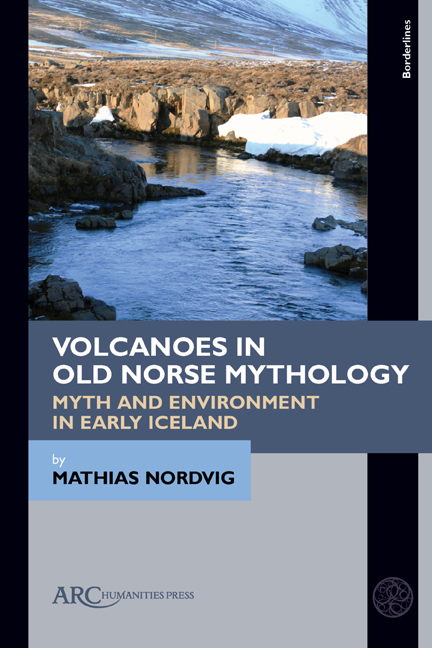Book contents
- Frontmatter
- Contents
- Introduction
- Chapter 1 Old Norse Mythology Between Environment and Literature
- Chapter 2 An Indigenous Theory of Volcanism in Iceland
- Chapter 3 Volcanism in Old Norse Cosmogony
- Chapter 4 Volcanoes in the Social Order of Old Norse Mythology
- Chapter 5 Volcanoes as a Cosmological Principle in Old Norse Mythology
- Bibliography
- Index
Chapter 5 - Volcanoes as a Cosmological Principle in Old Norse Mythology
Published online by Cambridge University Press: 13 April 2021
- Frontmatter
- Contents
- Introduction
- Chapter 1 Old Norse Mythology Between Environment and Literature
- Chapter 2 An Indigenous Theory of Volcanism in Iceland
- Chapter 3 Volcanism in Old Norse Cosmogony
- Chapter 4 Volcanoes in the Social Order of Old Norse Mythology
- Chapter 5 Volcanoes as a Cosmological Principle in Old Norse Mythology
- Bibliography
- Index
Summary
IN THE PRECEDING chapters I have demonstrated how Old Norse mythology undergoes a reconceptualization in the Icelandic environment. Older structures in myths are applied in a new form, which appears to be impressed with the volcanic environment that the early Icelanders encountered. This is not surprising when one considers Åke Hultkrantz's realizations in his study of the Shoshone religion. If a culture enters a new environmental setting, its mythology will adapt to it, just like subsistence strategies and other habits will. In Iceland we can see this process of adaptation developing from skaldic and Eddic poetry to Snorri's myths in the Edda. At the time of writing there are two competing modes of conceptualizations of the environment: there is the traditional indigenous mode, which rests on a bedrock of oral narration that emanates from continental Scandinavia, and there is the literary narration, which rests on the Latinate script-world.
The literary treatment of volcanism in medieval Iceland has been perceived as a matter-of-fact attitude, leaving out emotions. I have proven that this is not the case. There is a development of literary practices in the medieval period, where chronicles are used as means to record volcanism in context of that literature's primary objective. Its primary objective is religious record keeping. Similarly, continental reasoning about volcanism adopted from religious texts is expressed in Konungs Skuggsjá. Kristni saga has been considered an example of matter-of-fact attitude in early Iceland, yet we understand that it is founded on religious modes of thinking and suggests that the previous religious attitude is unwelcome: the pre-Christian idea that supernatural beings are involved and that they cause eruptions in context of emotions.
In the remnants of the oral narration of volcanism in Iceland we find Hallmundarkviða as the primary example. It is composed in dróttkvætt, the oral Icelandic artform that has the best potential for retention and long-term preservation and is considered the authority on the past. In the medieval period it is placed in literary narration in accordance with the Latinate script-world tradition. The poem unambiguously attributes volcanism to supernatural beings: it uses indigenous cultural modes of expression, it makes use of artefacts that are culturally relevant, and it infers emotion in the event as a primary motivation.
- Type
- Chapter
- Information
- Volcanoes in Old Norse MythologyMyth and Environment in Early Iceland, pp. 119 - 136Publisher: Amsterdam University PressPrint publication year: 2021



